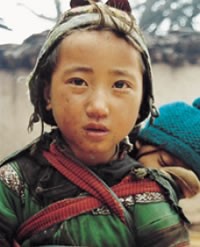Nasu, Eastern in China

Photo Source:
Copyrighted © 2026
Operation China, Asia Harvest All rights reserved. Used with permission |
Send Joshua Project a map of this people group.
|
| People Name: | Nasu, Eastern |
| Country: | China |
| 10/40 Window: | Yes |
| Population: | 273,000 |
| World Population: | 273,000 |
| Primary Language: | Yi, Wuding-Luquan |
| Primary Religion: | Ethnic Religions |
| Christian Adherents: | 35.00 % |
| Evangelicals: | 29.02 % |
| Scripture: | Complete Bible |
| Ministry Resources: | No |
| Jesus Film: | Yes |
| Audio Recordings: | Yes |
| People Cluster: | Tibeto-Burman, other |
| Affinity Bloc: | Tibetan-Himalayan Peoples |
| Progress Level: |
|
Introduction / History
The Nasu call themselves Nasu Puo. (Puo is an Yi word meaning "tribe" or "nationality.") Their name means "black people." In the past the Chinese called the Nasu Gani, which means "dry Yi." Early missionaries called this group Gani or Kopu.
Eastern Nasu - which has 24 vowels - is part of the Eastern Yi group of Tibeto-Burman. Nasu has an ancient script which can only be read by bimos (shamans).
For centuries - until the advent of Communism in 1949 - the Eastern Nasu captured slaves from among the Eastern Lipo and other ethnic groups in the region.
What Are Their Lives Like?
Prior to their conversion to Christianity, the Eastern Nasu carried around small baskets which they believed contained the souls of their ancestors. In 1909 Australian missionary Arthur G. Nicholls first contacted the Eastern Nasu. He reported, "These people are very drunken and immoral. We asked them if they were willing to throw away the baskets in which they profess to keep the spirits of their ancestors, and six families thereupon burnt their spirit baskets and other articles used in their dealings with demons."
What Are Their Beliefs?
The Eastern Nasu were trapped in a never-ending cycle of spirit appeasement until they turned to Christ. At the beginning, comprehension of their new religion was slow. It was reported: "They understand very little of Christian doctrine. But they understand that Christianity means no whisky and clean living. But when men and women are willing to take the spirit baskets their tribe has venerated for ages, and utensils used in demonolatry, and make a bonfire for them, it may be inferred that interest has deepened into conviction and conversion. Overall, this region the Sun of Righteousness is rising, and the people are turning to the light."
By 1914 a few Eastern Nasu churches had been established in Salowu, but the missionaries were stretched to the limit. "We are at our wits' end for workers. The work is pitifully undermanned." In response, the Lisu and AHmao churches sent evangelists to the Eastern Nasu. The four gospels were translated into Eastern Nasu in 1913, using the script invented by missionary Samuel Pollard. By the 1940s the Eastern Nasu church was being "used of God not only in evangelizing their own districts but also in sending missionaries to seek out and find untouched sections of their tribe in dangerous and far-distant territories. Magnanimously they have given out of overwhelming poverty so that many evangelistic journeys could be taken, and the number of families won to the Lord are counted in the hundreds."
What Are Their Needs?
The Eastern Nasu people need better medical facilities in their region.
Prayer Points
Pray Eastern Nasu Christians will be filled with holiness and used by the Lord to spread his light to those who remain in darkness.
Pray for many Eastern Nasu to be used by the Lord to spread the gospel far and wide.